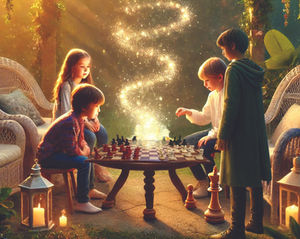Timeless Dance of Beauty
- Javier Romano

- Apr 11, 2020
- 3 min read
Updated: Mar 9, 2025
How long can a Quaternity game last?
As long as you wish.
Four of us—each in a different country—began a game on November 19th last year. Each of us had our own physical chessboard at home, using an online Excel board to communicate moves and WhatsApp for messages.
The only condition? At least one move per day per player.
Now, nearly five months later, this image shows the current state of the game.
It has been a fascinating experience, and I’d like to share a few observations:
The most obvious one: there is no rush to make a move. This removes the stress factor—whether you are a slow or fast thinker, it makes no difference.
You can carefully assess the entire board, considering the possibilities of all three opposing armies at any given moment.

The experience feels as if time has frozen. A complete stillness—yet at the same time, an underlying potential for movement in many directions.
There is no immediate anxiety or sense of threat. Even when a hazard is approaching, it hasn’t happened yet.
There is beauty at every stage of the game. Every move follows a pattern, creating endless combinations.
If you take the perspective of each opponent—one at a time—something strange happens: suddenly, you become them. You feel as if their army is your own, and you start devising a strategy accordingly.
When you return to your own seat, you have a clearer sense of what the others might do. This is often called putting yourself in someone else’s shoes, but here, it takes on a deeply tangible form.
The competitive aspect fades into the background, dissolving into a broader awareness. You no longer focus on defeating the others—you become part of a cosmic dance, where every action influences the whole. The end result matters less. The journey becomes the transcendent part of the game.
There is a geometric and mathematical rhythm to the movements. This is often lost when time constraints force rushed decisions. It’s like the difference between speeding down a highway at 90 miles per hour and stepping out to walk through the fields, appreciating the landscape.
A game played without a timer allows for peripheral vision. While this skill improves with practice even under time pressure, the details remain blurred. Without the urgency, however, your awareness expands—like a falcon’s view, encompassing everything at once.
Arif Ali-Shah, in his brilliant introduction to Quaternity Rules, speaks of the “implied intention” behind a move. This intention becomes far clearer when time is not pressing. Hiding in plain sight is more obvious when the board remains still.
If one is no longer bound by the time factor—by the prison of the five senses—a different dimension opens up. Here, contemplation replaces the frantic unfolding of events, and a deeper perception emerges.
I had only glimpsed this kind of liberation from time once before—many years ago, while playing tennis with a friend.
What is commonly called being in the zone took on a surreal clarity. Suddenly, the game seemed to slow down unnaturally. Without any deliberate effort, I found myself in a state where I could anticipate the ball’s movement with absolute ease. It felt as though I had all the time in the world—enough to position myself, align my body, visualize my shot, and execute it with precision. (Also to smoke a cigarette? No—but almost!).
Meanwhile, my opponent, still locked in conventional time, had no chance of returning a single ball.
Feeling refreshed, I almost joked, “Another round?” But the moment wasn’t right for humor, so we stopped.
The real question that lingered in my mind was: How can I enter this state permanently?
Imagine the possibilities—if we could step beyond the constraints of time at will. Life itself would become smoother, choices clearer, and decisions more precise. With an expanded awareness of the extra-sensory dimensions that shape every situation, everything would suddenly make perfect sense.
A gateway to another level of perception—one that Quaternity invites us to explore.
J. Romano
♛♔








Comments